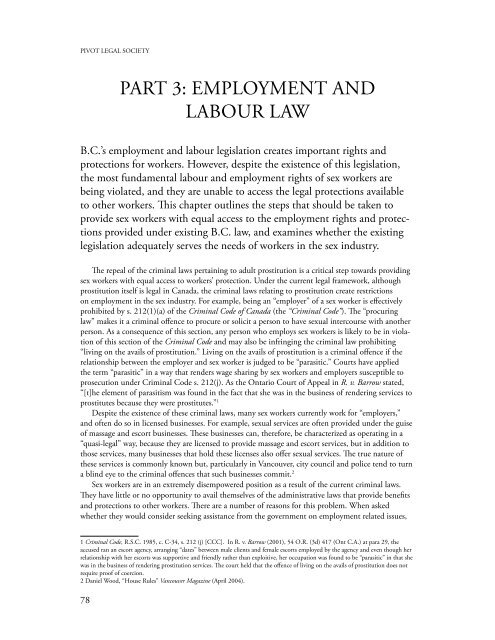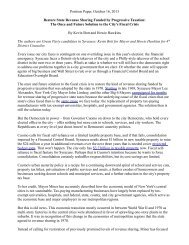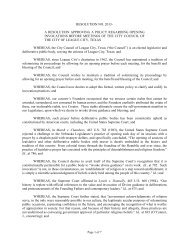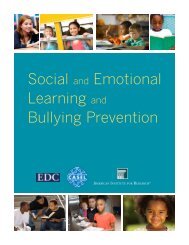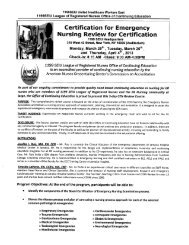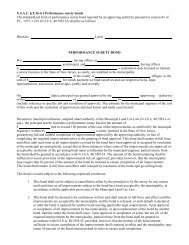Beyond Decriminalization: Sex-work, Human Rights and a New ...
Beyond Decriminalization: Sex-work, Human Rights and a New ...
Beyond Decriminalization: Sex-work, Human Rights and a New ...
- No tags were found...
Create successful ePaper yourself
Turn your PDF publications into a flip-book with our unique Google optimized e-Paper software.
PIVOT LEGAL SOCIETYPART 3: EMPLOYMENT <strong>and</strong>labour lawB.C.’s employment <strong>and</strong> labour legislation creates important rights <strong>and</strong>protections for <strong>work</strong>ers. However, despite the existence of this legislation,the most fundamental labour <strong>and</strong> employment rights of sex <strong>work</strong>ers arebeing violated, <strong>and</strong> they are unable to access the legal protections availableto other <strong>work</strong>ers. This chapter outlines the steps that should be taken toprovide sex <strong>work</strong>ers with equal access to the employment rights <strong>and</strong> protectionsprovided under existing B.C. law, <strong>and</strong> examines whether the existinglegislation adequately serves the needs of <strong>work</strong>ers in the sex industry.The repeal of the criminal laws pertaining to adult prostitution is a critical step towards providingsex <strong>work</strong>ers with equal access to <strong>work</strong>ers’ protection. Under the current legal frame<strong>work</strong>, althoughprostitution itself is legal in Canada, the criminal laws relating to prostitution create restrictionson employment in the sex industry. For example, being an “employer” of a sex <strong>work</strong>er is effectivelyprohibited by s. 212(1)(a) of the Criminal Code of Canada (the “Criminal Code”). The “procuringlaw” makes it a criminal offence to procure or solicit a person to have sexual intercourse with anotherperson. As a consequence of this section, any person who employs sex <strong>work</strong>ers is likely to be in violationof this section of the Criminal Code <strong>and</strong> may also be infringing the criminal law prohibiting“living on the avails of prostitution.” Living on the avails of prostitution is a criminal offence if therelationship between the employer <strong>and</strong> sex <strong>work</strong>er is judged to be “parasitic.” Courts have appliedthe term “parasitic” in a way that renders wage sharing by sex <strong>work</strong>ers <strong>and</strong> employers susceptible toprosecution under Criminal Code s. 212(j). As the Ontario Court of Appeal in R. v. Barrow stated,“[t]he element of parasitism was found in the fact that she was in the business of rendering services toprostitutes because they were prostitutes.” Despite the existence of these criminal laws, many sex <strong>work</strong>ers currently <strong>work</strong> for “employers,”<strong>and</strong> often do so in licensed businesses. For example, sexual services are often provided under the guiseof massage <strong>and</strong> escort businesses. These businesses can, therefore, be characterized as operating in a“quasi-legal” way, because they are licensed to provide massage <strong>and</strong> escort services, but in addition tothose services, many businesses that hold these licenses also offer sexual services. The true nature ofthese services is commonly known but, particularly in Vancouver, city council <strong>and</strong> police tend to turna blind eye to the criminal offences that such businesses commit. <strong>Sex</strong> <strong>work</strong>ers are in an extremely disempowered position as a result of the current criminal laws.They have little or no opportunity to avail themselves of the administrative laws that provide benefits<strong>and</strong> protections to other <strong>work</strong>ers. There are a number of reasons for this problem. When askedwhether they would consider seeking assistance from the government on employment related issues, Criminal Code, R.S.C. 1985, c. C-34, s. 212 (j) [CCC]. In R. v. Barrow (2001), 54 O.R. (3d) 417 (Ont C.A.) at para 29, theaccused ran an escort agency, arranging “dates” between male clients <strong>and</strong> female escorts employed by the agency <strong>and</strong> even though herrelationship with her escorts was supportive <strong>and</strong> friendly rather than exploitive, her occupation was found to be “parasitic” in that shewas in the business of rendering prostitution services. The court held that the offence of living on the avails of prostitution does notrequire proof of coercion. Daniel Wood, “House Rules” Vancouver Magazine (April 2004).78


